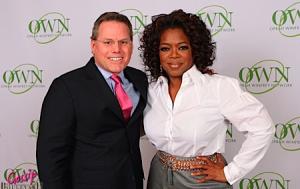- MENU
- HOME
- SEARCH
- WORLD
- MAIN
- AFRICA
- ASIA
- BALKANS
- EUROPE
- LATIN AMERICA
- MIDDLE EAST
- United Kingdom
- United States
- Argentina
- Australia
- Austria
- Benelux
- Brazil
- Canada
- China
- France
- Germany
- Greece
- Hungary
- India
- Indonesia
- Ireland
- Israel
- Italy
- Japan
- Korea
- Mexico
- New Zealand
- Pakistan
- Philippines
- Poland
- Russia
- South Africa
- Spain
- Taiwan
- Turkey
- USA
- BUSINESS
- WEALTH
- STOCKS
- TECH
- HEALTH
- LIFESTYLE
- ENTERTAINMENT
- SPORTS
- RSS
- iHaveNet.com

Determined to find hits, cable TV networks keep breaking out of narrowly defined brands.
A&E, TLC, AMC and E! have long since become little more than meaningless letters. Now Cartoon Network is toon-ing out by airing live-action reality shows, just as the History Channel strays from lower-case history.
In stark contrast to this, there's the Oprah Winfrey Network (OWN for short), a channel so committed to its brand -- the daytime host's "Live your best life" mantra -- that the specific nature of its programs remains something of an afterthought as the venture readies for next year's debut.
Winfrey's Discovery-backed channel has plenty of time to formally get its lineup together, but based on a spring preview for advertisers, the programming will draw heavily upon experts and Oprah pals -- typical lifestyle programming, distinguished foremost by the Oprah seal of approval.
And what a seal that is, despite periodic slings and arrows tossed its way. Among the few remaining certainties in journalism is that daring to second-guess Oprah means preparing oneself for a vehement response from those who consider her a transformative figure doing nothing less than bettering the world.
To these committed fans -- and they are legion -- Winfrey's occasional missteps (enthusiastically championing what turns out to be a fraudulent memoir, say, or the odd nonsense diet) detract in no way from her mission. Indeed, criticism such as Newsweek's recent cover story regarding questionable medical advice dispensed on the daytime program only seems to make them cling to her more ferociously.
Then again, most analysis of Winfrey at this late stage -- from that circulation-hungry magazine's expose to a more worshipful CNBC special titled "The Oprah Effect" -- is pretty transparently an attempt to draft off her name. It's not like there are many curveballs left, pro or con, in the Oprah arsenal of pitches.
Scanning the dial, one nevertheless wonders what Oprah knows that the rest of the cable world doesn't
Programmers that once derived strength from pre-sold niches (American Movie Classics, Arts & Entertainment, The Learning Channel, etc.) deemed those labels too constraining. Eager to pursue younger audiences, they abandoned the law of letters to scrounge for ratings on an a la carte, show-by-show basis.
Although some of these channels have scored network-defining successes ("Mad Men," "Intervention," "Jon & Kate Plus 8," etc.), each step away from their brand by definition means less default viewing.
OWN CEO Christina Norman is keenly aware of this dynamic, saying that the new channel is determined to be "as focused as possible" in "serving Oprah's vision" -- a vision that extends from the flagship syndicated program to publishing, satellite radio and now basic cable.
"A lot of networks have gone off chasing hits, and there's a bit of sameness out there," Norman says. "I was trained as a brand builder. ... Once you start bending your brand, you can kind of never stop."
In such a crowded marketplace -- with a couple of dozen new series premiering each month on various networks -- the Tao of Oprah sounds infinitely clearer.
Not that the Oprah formula will work for everybody
After all, few celebrities can magically cause products to fly off shelves merely by citing them among her "favorite things." The Newsweek piece noted that the host has cemented an image unlike any other in TV -- one that says, "Oprah is not here to amuse you; she is here to help you."
As Norman puts it minus the sarcasm, "People want a television experience that is more than just mindless entertainment." Besides, where else could spending an hour planted on the couch be rationalized as "best life" homework?
Still, the larger strategy -- trust and embrace this brand -- traditionally spared networks from needing to prove themselves in every timeslot. Anybody who has ever mindlessly flipped to ESPN or the Weather Channel in a hotel room understands this.
Unlike Forrest Gump and that unpredictable box of chocolates, there is something reassuring about knowing precisely what you'll get on TV, whether the appetite is for history, cartoons or old movies.
As a consequence, before any more cable networks shed established niches, they might want to pause and ask WWOD -- as in "What Would Oprah Do?"